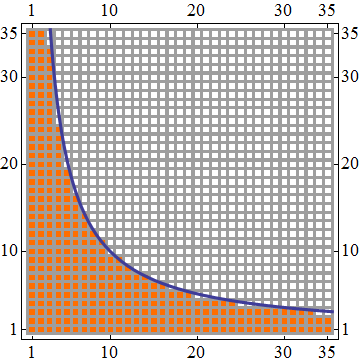I was going to post an answer for fast way to replace all zeros in the matrix. I was even quite happy because timings were the same order of magnitude as others.
The idea was to overwrite Identity:
Internal`InheritedBlock[{Identity}, Unprotect[Identity]; Identity[0] = 1;
Map[Identity, {{2, 0}, {Pi, 9}}, {2}]]
{{2, 1}, {Pi, 9}}
But I've checked that for bigger matrices the result is not even close to the expected one:
Internal`InheritedBlock[{Identity}, Unprotect[Identity]; Identity[0] = 1;
m = RandomInteger[1, {100, 2}];
Map[Identity, m, {2}] ~ Shallow ~ {5, 2}]
{{0, 1}, {1, 0}, <<98>>}
It seem it breaks at size of the array of about $90$ positions:
test = Internal`InheritedBlock[{Identity}, Unprotect[Identity]; Identity[0] = 1;
Apply[
Boole[Map[Identity, RandomInteger[1, {##}], {2}] == ConstantArray[1, {##}]
]&,
Array[List, {35, 35}],
{2}]];
Show[MatrixPlot[test, DataReversed -> True, Mesh -> All],
ContourPlot[x y == 90, {x, 1, 35}, {y, 1, 35}]
, BaseStyle -> {[email protected], 18}]

I hope I haven't missed anything obvious. Any ideas?

SystemOptions["CompileOptions" -> "MapCompileLength"]and the plot changed, but now even after restarting the kernel I can't reproduce the original plot. Strange indeed :) $\endgroup$Mapdoes not care about overwritten definition? $\endgroup$Identityand assumes it knows how that behaves, not looking for changed definition. $\endgroup$Mapauto-compiles, basically applyingCompileto your mapped function. Of course,Compileuses its own versions for compilable functions, so whatever top-level definitions you have made won't fire. $\endgroup$